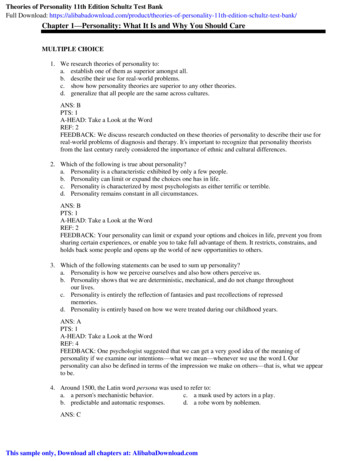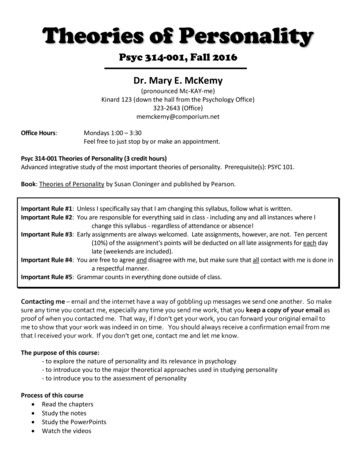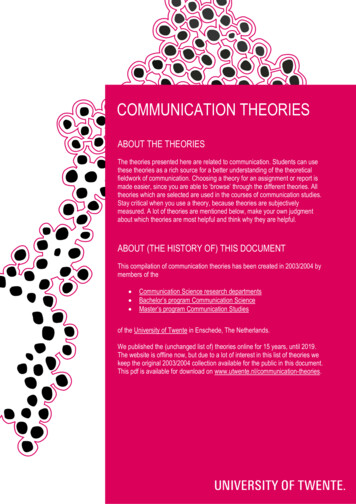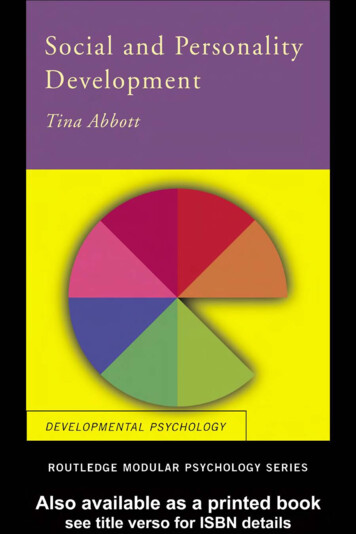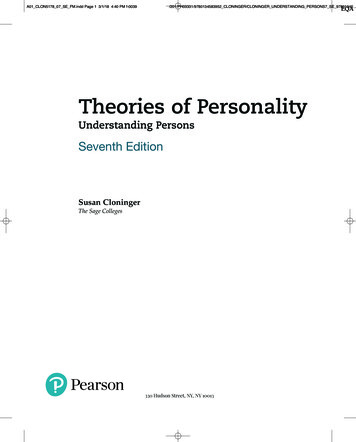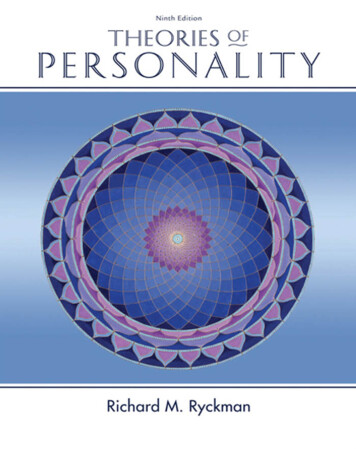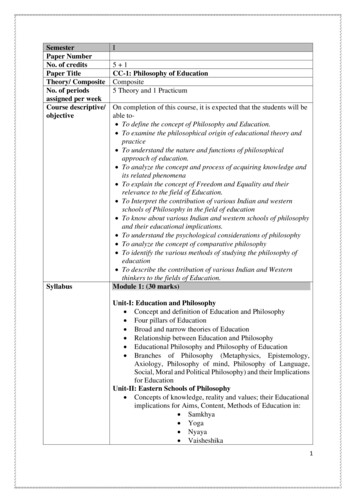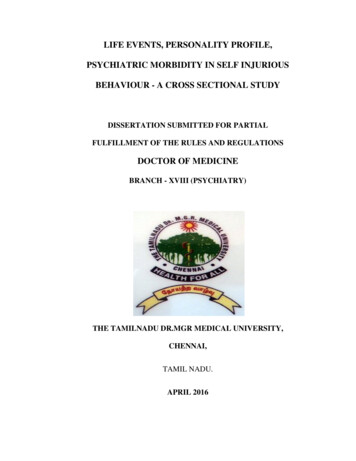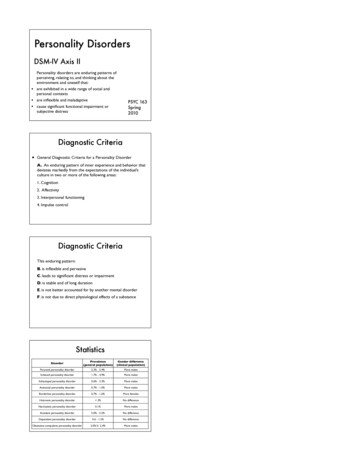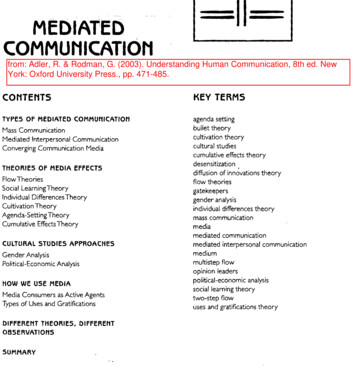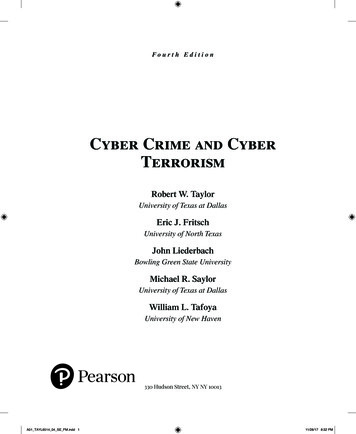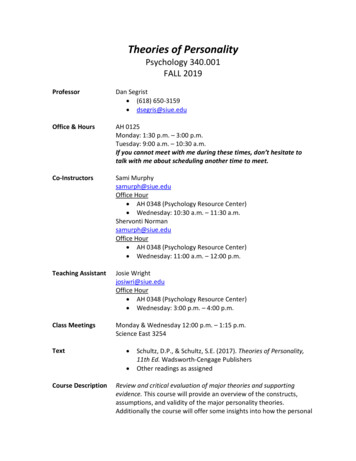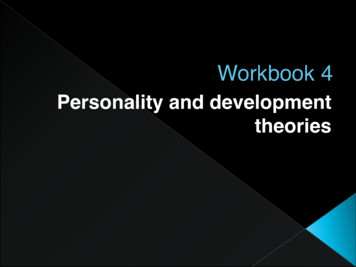
Transcription
Workbook 4Personality and developmenttheories
Nature –nurture theoryHow much is one’s personality and humandevelopment is influenced by what we areborn with (nature) and what we learn fromour environment (nurture)Nature theory – inherited predisposition'sNurture theory – learned attitudes
Understanding the relationship betweenheredity and environment The question ‘how much’?HeritabilityConcordance – a second measure used to infer thecontribution of heredity to complex characteristicsLimitations of heritability and concordanceThe question ‘how?’Passive and evocative correlations - at young ages thereare two types of genetic-environmental correlation arecommon. First called passive correlations because thechild has no control over it. The second is called evocativecorrelation which is a type of genetic- environmentalcorrelation.Active correlation
Lifespan DevelopmentIn lifespan development, we assume changesin behaviour are not random or accidental.We believe that all behaviours can beunderstood in terms of developmentaldynamics.
Lifespan development theories Psychological theories› Psychoanalysis› Cognitive development Theory›››› Sociological theories›››› BehaviourismSocial learning theoryHumanismEcological theorySymbolic interactionismSocial exchange theoryFamily development theoryConflict theoryBiological theories› Wear-and-tear theory› Cellular theory› Immunity theory
Freud’s theory of PersonalityLevel of Freudian consciousness - one of his majorbeliefs was that individuals are generally not aware ofunderlying reasons of their behaviour. Personality components: Id, Ego and Superego:› Id is the original inherited system, the instinctive aspectof the personality› Ego – is the organism’s contact with the externalenvironment. As ego develops it learn to operate on thereality principle, it learns to choose attainable goalsbefore discharging tension or energy, which makes formore efficient ego› Superego – which appears when the child isapproximately 5 years old. It operates on what might becall perfection principle
An easy way to remember to use the 3 Freudianpersonality components is to use the modernpsychodynamics terms: Child ( Id) Adult ( Ego) Parent ( Superego)Remember : All emotions, moods, drives, playfulness andmisbehaving are Child features All logic, planning, problem-solving, peacekeeping and umpiring are Adult features All moralising, criticising, bossing, blaming andpunishing are Parent features
Freud’s psychosexual development theoryIn utilising an epigenetic and discontinuous framework,Freud identified five stages of psychosexualdevelopment.i.Oral0-1.5Pleasure such as eatingsucking and vocalisingderived from oral cavityii. Anal1.5-3Pleasure derived fromanal area, includingretention and expulsionof faecesiii. Phallic 3-5Pleasure derived frommanipulation of genital organs.Curiosity directed towardsexuality of self and others
iv. Latency period6-11 Tranquil period of timebetween stages.Refinement of selfconcept andincreased peer groupinteraction.Emergence of copingor defense mechanismsv. Genital11 Onset of puberty andadolescencediscovery of new sexualfeelings. Developmentof heterosexualattraction. Beginning ofromantic love
Anxiety and defence mechanismsFreud’s model of personality dynamics This discomfort may leadto the use if defence mechanisms which may temporarily relivedanxietyIntrapsychic conflict (between Id, ego and superego)AnxietyReliance on defence mechanisms
Maslow’s hierarchy of needsThe key principle of Maslow’s theory of selfactualisation, is that human needs andmotivations to meet those needs, exist in ahierarchy from the most basic to the mostadvances. In order to achieve selfactualisation, one strives to progress up thismotivational pyramid, meeting the mostprimary needs first. This theory assumesthat basic needs must be satisfiedreasonably well before higher needs areactivated
Maslow’s theory summarisedSelfactualisationSelf-esteem needsNeed for love & belongingSafety & security needsPhysiological Needs
Erickson’s psychosocial stagesStage/crisisAgeWhat type of events or activities arecommon during this stageTrust VS mistrust0-1Infants receive proper love, care &affection VS if not met they becomefearful, mistrustAutonomy VS shame& doubt1-3Initiative VS guilt3-5Develop mote and mental ability,experience independence VSdiscouragement, disapproval of theirabilities & harbour doubtSelf-initate exploration & discovery VSrestrictiveness promotes guilt whendiscovering on their ownIndustry VS inferiority 6-11Identity VS roldconfusionadolesceManipulate objects & learn how thingswork VS inferiority result inmischievous, troublesome, sillybehaviourSense of self, personally expectable it ishoped & distant from others VS feelingsof isolation, inadequacy andindecisiveness
Intimacy Vs isolationYoung adult hoodClose & meaningfulrelationship with others VSunable/unwilling suffersense of loss & isolationGeneratively VS selfabsorptionMiddle adult hoodIntegrity VS despairOld ageLook beyond self & expressconcern VS pre-occupiedwith personal well being &material gainNurturing sens of integrityVS series ofdisappointment, failuresand misfortunes.
Other psychodynamic theoriesRobert Peck’s theorySimilar to Erickson’s theory, Peck proposes a seriesof crises needing to be addressed by aging adults.The following is a summary of the adjustments. Psychological adjustments of middle adulthood Valuing wisdom versus valuing physical powersSocialising verses sexualising in human relationshipsCathartic flexibility versus cathartic impoverishmentMental flexability verus mental rigidity
Psychological adjustments of late adulthood Ego differentiation versus work-rolepreoccupation Body transcendence versus ego preoccupation Ego transcendence versus ego preoccupation
Jane Loevinger’s theoryStimulated by the work of Freud and Erickson, JaneLoevinger provides a unique discontinues theory. Pre-social (infancy) Impulsive (early childhood) Self-protective (early school years) Conformist ( late childhood and early adolescent) Conscientious (late adolescence) Autonomy (adulthood) Integration (adulthood)
Piaget’s stages of cognitive developmentStageAgeSignificant cognitive developmentsSensor motor &sensory development0-2Engagement in primitive reflex activity.Gradual increase in motor awarenessPreoperational2-7Concrete operations7-11Formal operations11-15Increase in language and conceptdevelopment. Child is largely thoughegocentric. Animism is prevalent inthinkingCan understand the law ofconservation and reverse mentaloperations. Objects can be classifiedand ordered in a series along aAbstract thought and scientificreasoning emerge. Problems areapproached with advanced logic andreason
Stages of Cognitive theories Information processing theoryLearning theoriesBehaviourismSocial learning theoryA critique of learning theoryA critique of ethological theoryHumananistic theoryMaslows theory of self-actulizationRodgers self concept theoryEcological theory
Personality theoryWhat is Personality – when you talk aboutsomeone’s personality what do you reallymean?Many different description are possible, butwhen most people use the term personalitythey are using two purposes. Of the manythings that a person may be, we often identifyhim or her in terms of the singlecharacteristic that is most obvious. Theimpression we make ion people may be usedby them to label our ‘personality’.
Learning“Reward and punishment these are the spurand reins whereby all mankind are set onwork and guided” John LockeOnce your understanding the laws of learning,you relize that behaviour can change for thebetter --- and you understand why often doesnot. Psychologists believe that learning isany relatively permanent change inbehaviour that occurs because ofexperience.
Principals of classical conditioning› Extinction› Higher-Order conditioning Stimulus generalisation and discriminationClassic conditioning in real life Learning to like Learning to fear Accounting for taste Reacting to medical treatments Operant conditioningThe birth of radical behaviourism
The consequences of behaviourIn Skinner’s analysis, which has inspired animmense body of research, a response canlead to one of three types of consequences.1. A neutral as far as a future behaviour isconcerned2. Reinforcement strengths the response or makesit more likely to recur3. Punishment weakens it or makes it less likely torecur.
Thank you for watchingthis video and goodluck with workbook 4.Bye for now !
Piaget's stages of cognitive development Stage Age Significant cognitive developments Sensor motor & sensory development 0-2 Engagement in primitive reflex activity. Gradual increase in motor awareness Preoperational 2-7 Increase in language and concept development. Child is largely though egocentric. Animism is prevalent in thinking
